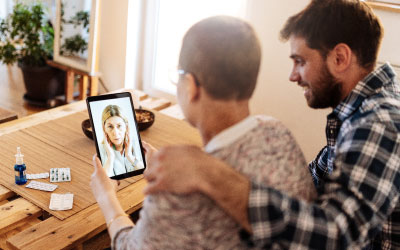Is a Clinical Trial Right for Me?
You might discover that new leukemia treatments are available through clinical trials as you research your treatment options. You’ll have many factors to consider when deciding to participate in a clinical trial.
The video, "Is a Clinical Trial Right for Me?" (right) highlights some things to consider. Thank you to Eytan Stein, MD, leukemia expert at Memorial Sloan Kettering Cancer Center, for contributing to the video.
Participating in a clinical trial
Think about your “why” for joining a clinical trial. People participating in research studies have answered this question in the following ways:
- They want to help other people with the same type of cancer in the future. These people may even include family members at risk for developing the same condition.
- They want to try new treatments that might work better or have fewer side effects than existing treatments.
- They want to receive regular monitoring by healthcare professionals to track their progress.
- They want to be a part of scientific discovery and advancement of cancer treatments.
After determining your motivation, you should develop a list of specific questions about the clinical trial process or a particular trial.
You will need a doctor’s referral to take part in a clinical trial. Your oncologist (cancer doctor) should be able to answer questions, address your concerns, and help you with the process.
Learn more about what clinical trial questions to ask your doctor.
Risks versus benefits of clinical trials
You must consider the risks and benefits of participating in a clinical trial. If there are more pros than cons, it might be worth trying.
Potential benefits
Participating in a clinical trial means you may:
- Help others with the same type of leukemia fight their disease with better or more treatment options in the future.
- Benefit from the new treatment — not available outside of the trial — because it might work better than existing treatments.
- Feel like you are taking more active control over your health.
- Help to expand the boundaries of what is known about your condition and advance available treatment options for leukemia.
- Receive funding from sponsors or insurance coverage for part or all of your medical care and related expenses, such as travel or lodging. This may not hold true for all clinical trials.
Potential risks
One of the first questions you might ask is, “Are clinical trials safe?” Any medical procedure, treatment, or test carries an element of risk.
Clinical trial risks may be slightly higher because these risks are largely unknown. The trial aims to uncover these risks while keeping trial participants safe.
Some risks or drawbacks of clinical trials may include the following:
- Placement in the group that doesn’t receive the new treatment: In randomized clinical trials, researchers randomly assign you to a specific group. One group receives the new treatment. The other group receives the placebo and/or the best available standard of care. You won’t know which treatment you are receiving to decrease the risk of bias in the results.
- Unknown side effects: Side effects from the new treatment may differ or even be worse than existing treatments. This risk may depend on which phase of the trial it is. Phase 1 trials may be riskier than later phase studies because the possible side effects of the new treatment are not known yet. Rarer side effects may only appear during longer studies later in the assessment process.
- Differing treatment effects for each person: Each person absorbs and processes medications differently. The new treatment may work better for one person than for another.
- Increased time or travel: You may need to travel and stay in a hotel or hospital for the clinical trial. Other trials may need frequent in-person assessments and tests requiring extensive time or travel commitment.
- Added expense: People should choose to join a clinical trial based on their available finances and insurance coverage. You will want to ask if the costs are covered before you decide to participate in any clinical trial. Read more about clinical trial financial and insurance considerations.
After considering the pros and cons of participating in a clinical trial, you may better understand whether it is right for you.
Webinar video resource
The webinar video, “Clinical Trials: A Guide for Leukemia Patients and Caregivers,” addresses how leukemia treatment has been changed by clinical trials, how clinical trials are developed, and factors to think about if you are considering a clinical trial. It is presented by Karen Carlson, MD, PhD, from Medical College of Wisconsin.




